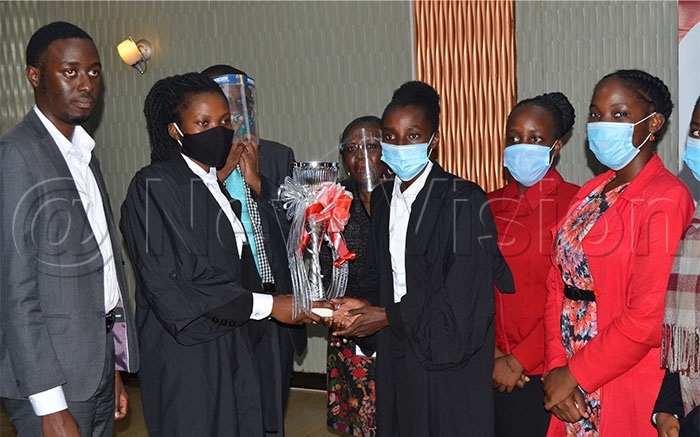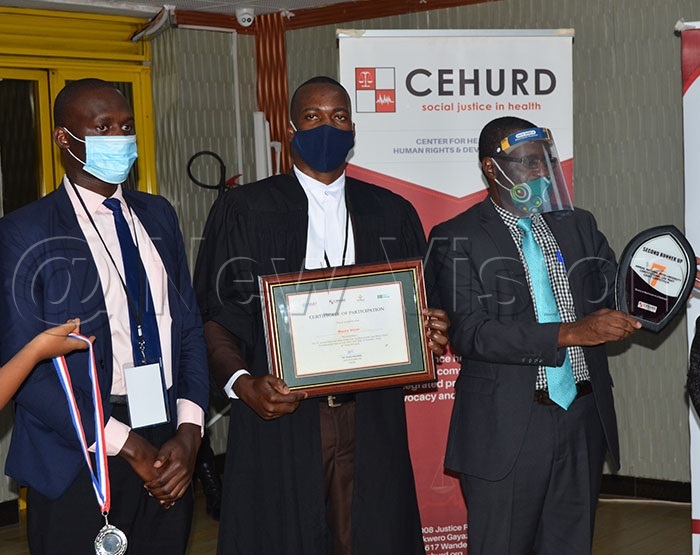UCU wins moot court competition
UCU emerged the best with an average score of 391.5 followed by Islamic University in Uganda with 343.5.
UNIVERSITY|COURT|COMPETITION
KAMPALA - Uganda Christian University (UCU) Kampala campus has won this year's inter-university constitutional law moot court competition.
The Moot Court competition is aimed at aiding law students to improve their public speaking skills and give them experience in the litigation process in Uganda.
At least eight universities participated in the annual Moot Court competition, these are; Makerere University, Uganda Christian University, Islamic University in Uganda (IUIU), Cavendish, Gulu University, Uganda Pentecostal University, and Bishop Stuart.
UCU emerged the best with an average score of 391.5 followed by Islamic University in Uganda with 343.5.
The best university was awarded a trophy and participants were given certificates.
The best students were Catherine Katushabe with 81.2 points and Mary Adikin with 75.2 both from UCU.
The annual Moot Court competition which is organized by Centre for Health, Human Rights and Development (CEHURD) has built a cohort of young lawyers who appreciate the right to health and its Justifiability within the confines of Uganda's legal system.

The final competition that took place at Hotel African on Friday (October 30, 2020) was before a panel of five justices, including two Retired Justices and Justices of the Supreme Court, Court of Appeal and the Principal Judge.
Moot court competition aspires to train law students in legal writing, arguing of cases in court, professional conduct and means while arguing cases and preparation of court proceedings.
The former Principal Judge, James Ogoola, advised law students to learn about costs, saying it is the only way professional lawyers make money.
"When we are doing ordinary litigation, you should think about the parties to the case and make it a priority for the substantive matter to be adjudicated and let the cost come last," he said.
Ogoola, however, said during mediation, parties should be at the forefront of resolving their disputes.
"During mediation, a lawyer should not bring his costs until the parties finalize their issues," he states.
The Court of Appeal Judge, Remy Kasule appealed to the students to learn the practical aspect of law and often go to court to learn how cases are handled.
"If you are pursuing law, consider how often you go to court and how many times you offer legal aid as a practicing lawyer because there is so much suffering by the ordinary people," he said.
Kasule appealed to the universities to give them the mantle to setting crucial questions so that they can pursue cases together with graduates in the courts of laws.
Prof. Ben Twinomugisha, a lecturer of law at Makerere University also the Chairman Board of Trustees for CEHURD during his remarks said the students have benefited from the exercise and they need to be well versed with developments in the law.

He said the students should be able to enhance their advocacy legal research and writing skills.
"I could see some of your representations, you luck consistency and that may be up to bring from your weak writing skills, you need to develop creative thinking and writing skills, he advised.
Twinomugisha further advised the students to be more prepared to read cases beyond Uganda.
Twinomugisha said students should always get prepared for questions that may come from any judge of the panel at any time, in other words, they should read ahead.
Best students speak out
"I was the best moralist in the seventh annual CEHURD moot, when we came we expected more than what we got, we knew MAK which is most times challenging was a big threat," Katushabe said.
She also said when they proceeded to the court of appeal it was still a challenge because they had not prepared for the procedure on how someone proceeds before the court of appeal.
"As a lawyer or an advocate it shouldn't always be about you getting the money at the end of the day, it is about fully advocating more for the right that you want that person to be able to enjoy just as Rtd justice Ogoola said, the cost should always come last," Adikini the second runner-up said.